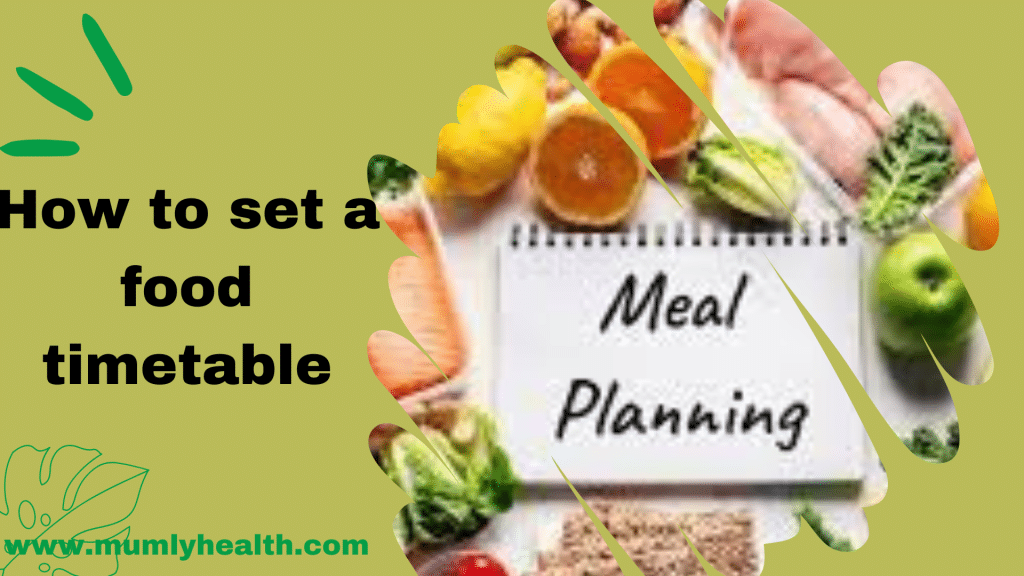Why do you need to set a food timetable? Many people ask this question, and some give up on the routine without getting an answer.
Food is a non-toxic substance that serves a healthy purpose when taken into the body.
In contrast, a food timetable is a table with a plan showing a course meal or set of food to be eaten at a particular period in a day with intentions to achieve a specific goal
Why should you have a food timetable?
A food timetable helps you to track your daily food intake and stick to a balanced course meal. It may be challenging to stick to, but if taken seriously can contribute to healthy living.
A standard food timetable can also help to watch your weight, maintain a balanced diet and keep you from over-feeding.
See Also: Foods that Increase Breast Milk in Kenyan. Get Your Milk Back!
Things to consider before setting up a food timetable
1. Reason
One must consider the reason or need for a food timetable; for instance, what has made you realize you need a food timetable?
Are you lightweight and would love to add weight? Are you not eating healthy? Are you overweight and would love to weigh? All these must be considered before setting up a food timetable to help you determine your aims and goals.
2. Income
One must consider their income before setting up a food timetable; this is because one thing is to set up a food timetable, and another thing is to keep up with it. Please do not set up a food timetable with meals you cannot provide at every needed time, as it will lead to a setback.
3. Aims/ goals:
It is believed that for every reason, an expected outcome should be considered in this process. To set a food timetable, one must know their goal and the result they expect to have while using the food timetable, as it would help to determine how effective the program is.
Things to consider while setting up a food timetable:
There are so many things that should be pointed out in the process of setting up a food timetable;
1. Time: One must consider the right time a meal should be taken and how it will favor them while setting up the timetable, significantly impact pact on the expected result.
For instance, someone trying to lose belly fat should avoid late-night foods and consider dinners before 7 pm.
2. Diet: One must consider the diet needed to get to the goal expected from the timetable. For instance, a person with diabetes should consider more ron-contained foods while avoiding excess carbohydrate intake. With this, one will know the type of food to keep and also remove from the timetable.
3. Food quantity: With a food timetable, one can watch the amount of food taken in at a particular time, depending on the goal and aim of the timeline. This will help people with light-weight and over-weight to monitor their food intake to get their expected results respectively.
4. Balanced diet: Every course meal must substitute at least 3 to 4 classes of food to keep the meal balanced and healthy, and each daily meal must consist of the 6 courses of food to attain a daily balanced diet.
Read also: Healthy Nigerian Food Ideas
Types Of Meal
1. Breakfast:
This is the food taken in the morning; it is an important meal that should not be skipped and taken in light quantity as it can affect one’s daily routine.
This should consist of light meals such as; tea and bread, cereals, pasta, noodles, and other foods.
2. Lunch:
This food is taken in the afternoon or middle of the day, usually less formal or lighter than the morning and evening food. It is also known as the recharge meal.
3. Dinner:
This is the main meal of the day, taken in the evening. It is usually the last meal of the day, and should be taken in minute quantity.
Steps Involved
Choose your schedule: Before planning and creating a timetable, you should be able to choose a convenient program that will give you enough time to prepare the meal.
Choose your diet recipe: The reason and aim of the food timetable will help to choose your diet recipe.
Add the recipes to the timetable: After choosing your diet recipe, add them to the scheduled time.
Create a grocery list: Go through each recipe and write out all ingredients needed to make them.
Grocery shopping: Take the grocery list and shop for the needed ingredients. Prepare meals when needed and eat.
Sample of a food timetable
Breakfast
Lunch
Dinner
Monday
Bread + Egg stew + Beverage
Yam and plantain porridge
Grilled Potatoes with fish sauce
Tuesday
Boiled yam + Vegetable stew
Jollof rice with beef/chicken
Bole and fish
Wednesday
Pancake + Beverage
Ogbono soup + Pounded yam
Rice and stew
Thursday
Cereal + Banana
Vegetable palm oil rice
Yam + corn beef stew
Friday
Toast bread + Beverage
Ofe nsala +Pounded yam
Jollof macaroni with eggs
Saturday
Moi-Moi + Pap
Coconut rice + Shrimps
Porridge Potatoes
Sunday
Akara +Bread + Beverage
Spaghetti Jollof with shredded chicken
Beans + Ripe plantain
Conclusion
Having a food timetable is important, mostly for busy people; as it reduces the stress of having to crack your brain on what to prepare, and when to prepare it. It’s advisable to ensure that the meals included in your food timetable are healthy and contain the classes of food needed for the body.
